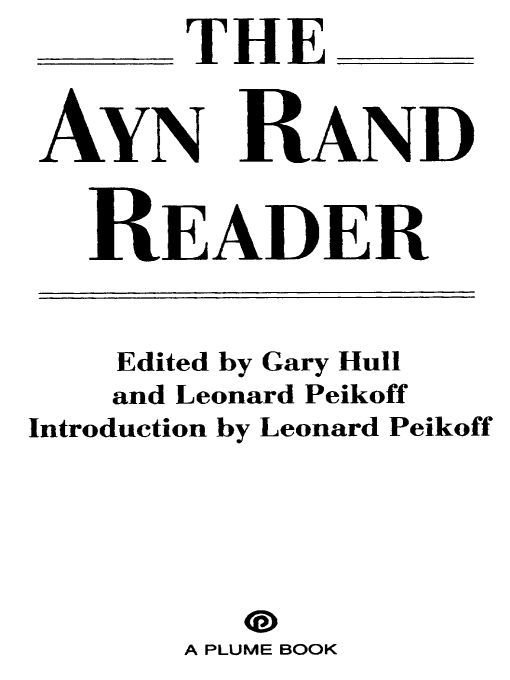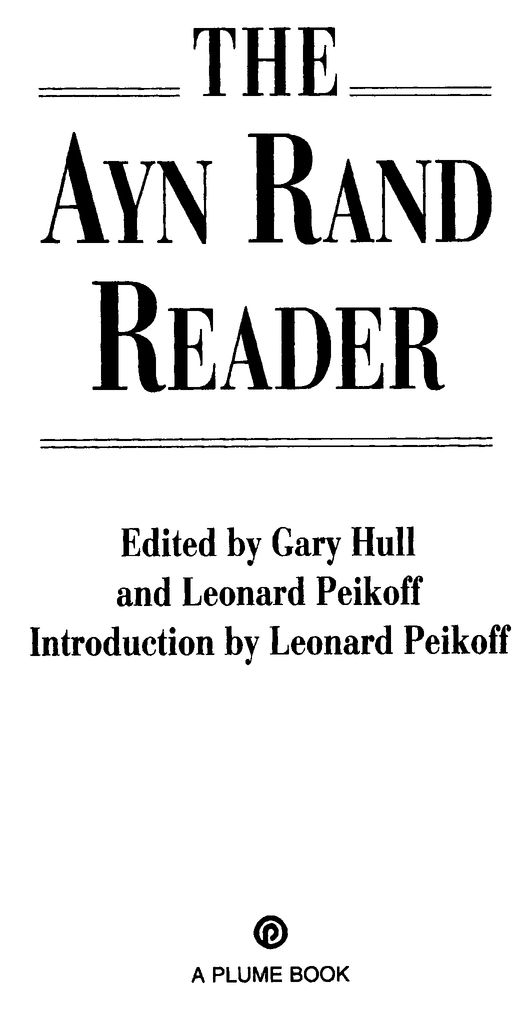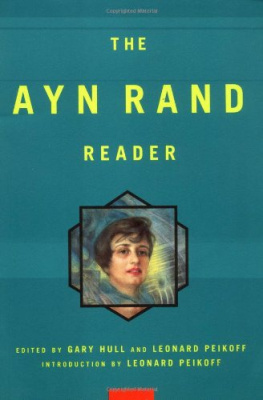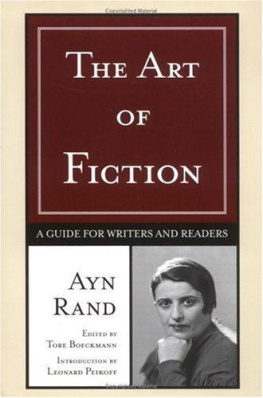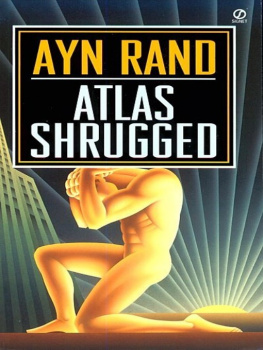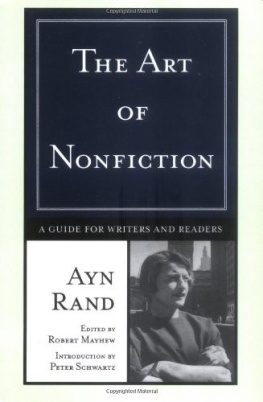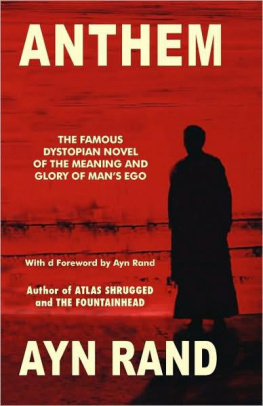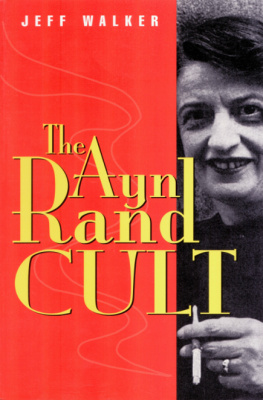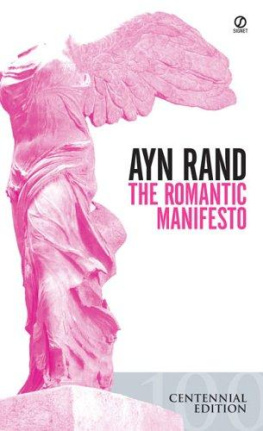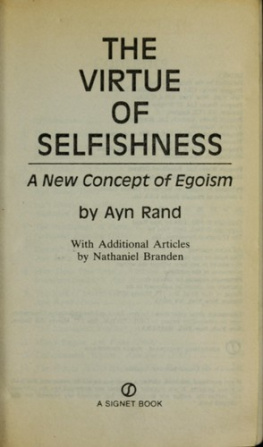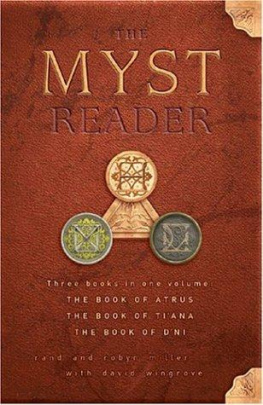Table of Contents
AYN RAND is the author of Atlas Shrugged, philosophically the most challenging best-seller of its time. Her first novel, We the Living, was published in 1936, followed by Anthem. With the publication of The Fountainhead in 1943, she achieved a spectacular and enduring success. Rands unique philosophy, Objectivism, has gained a worldwide audience. The fundamentals of her philosophy are set forth in such books as Introduction to Objectivist Epistemology, The Virtue of Selfishness, Capitalism: The Unknown Ideal, and The Romantic Manifesto. Ayn Rand died in 1982.
LEONARD PEIKOFF is universally recognized as the preeminent Rand scholar writing today. He worked closely with her for thirty years and was designated by Rand as her intellectual heir and as heir to her estate. He has taught philosophy at Hunter College, Long Island University, and New York University, and lectures on Rands philosophy throughout the country. Peikoff is the author of Objectivism: The Philosophy of Ayn Rand, and hosts the national radio talk show Philosophy: Who Needs It?
GARY HULL, who holds a Ph.D. in philosophy from Claremont, has taught philosophy at California State University, Fullerton, Whittier College, and is currently an adjunct professor at Duke University. He has lectured on Ayn Rands philosophy throughout the country and teaches an annual seminar on Objectivism for the Ayn Rand Institute.
INTRODUCTION
by Leonard Peikoff
AYN RANDS body of work, including posthumous collections, now extends to twenty-two volumes. Her best-known and most philosophical novels, The Fountainhead and Atlas Shrugged, number respectively 727 and 1,168 pages (in hardcover). This abundance of material poses a problem for many time-pressed readers. They do not know where to plunge in or how to select a representative sample. The present book is designed to meet these needs.
The readers I have in mind probably read relatively little fiction or philosophy. But they have noticed that AR is known virtually everywhereand that everyone seems to have an impassioned opinion about her. They have heard her books being extolled and denounced with equal intensityoften in quite unexpected quarters. Naturally enough, they are intrigued by the controversy.
Here is a chance for such individuals to explore her works briefly and reach a judgment of their own.
Although I hope it will be of value to previous readers of AR, this anthology is intended as an entre for those who know little or nothing about her. Each of her four novels and every branch of philosophy are represented within its pages, even if only in brief excerpts. Whoever finishes the book, therefore, can say in all conscience that he knows the essence of ARand that he knows it by means of actually having read her.
ARs philosophic ideas permeate each of her novels. In broad tendency, however, her early novels are devoted to social-political issues; The Fountainhead to ethical issues; and Atlas Shrugged, her magnum opus, to the fundamental branches of philosophy. This progression is the key to the present books organization (see the Editors Preface below).
Although the material has been organized in a definite structure, browsers who wish merely to dip in at random can profit from doing so. Those who wish to explore further will find that the selections are not only representative; they have been picked deliberately from a wide range of primary sources, and thereby suggest a fairly complete range of options for future reading.
As a mini-orientation for new readers, let me offer here a thumb-nail sketch of ARs Objectivist philosophy.
Metaphysics: The universe exists objectively, independent of consciousness. Its fundamental law is the law of identity, A is A.
Epistemology: Reason is mans only means of knowledge, both of facts and of values. Reason is the faculty of identifying and integrating, in conceptual form, the material provided by mans senses.
Ethics: The only scientific ethics is the ethics of rational self-interest, which holds that Mans Life is the standard of moral value and that rationality is the primary virtue. Each man, therefore, should live by his own mind and for his own sake, neither sacrificing himself to others nor others to himself.
Politics: The only social system consistent with the requirements of Mans Life is laissez-faire capitalism, the complete separation of state and economics. The proper function of government is to protect each individuals inalienable rights to life, liberty, property, and the pursuit of happiness.
Esthetics: Art is the re-creation of reality according to an artists metaphysical value-judgments-and the greatest school in art history is Romanticism, whose art presents things not as they are, but as they might be and ought to be.
To put the above in negative terms, AR rejects, among many other kindred isms, every form of supernaturalism, subjectivism, mysticism, skepticism, altruism, relativism, collectivism, statism, and (in art) both Naturalism and modernism.
As you may be starting to see, AR cannot be identified by using the conventional categories. She is neither a liberal nor a conservative. She admires Aristotle, but denies that moderation is the definition of virtue. She regards Libertarians as worse than Communists. She is a moralist who rejects religion, an individualist who dismisses Spencer, an egoist who denounces Nietzscheand a philosopher who writes thrillers. How is all this possible? Read on and find out for yourself.
The Ayn Rand Reader represents the work of two editors. Gary Hull, a longtime teacher of Objectivism, had the painful job of making the preliminary selections; he also devised the books structure and wrote the first draft of most of the editorial notes. As Executor of the Estate of AR, I myself then implemented a layer of suggestions, along with many editorial revisions.
Arnold Dolin, Associate Publisher of Dutton/Signet, had been urging me for years to prepare this kind of book. Unfortunately, the demands of other commitments always made it impossible. It is thanks to the labor of Dr. Hull that this anthology has finally become a reality. His work (which includes all the proofreading) was really the time-consuming part of the project.
I hope that The Ayn Rand Reader serves its purpose, and introduces AR to many readers who would otherwise be denied the pleasure and knowledge she has to offer.
Leonard Peikoff
Irvine, California
January 1998
EDITORS PREFACE
by Gary Hull
TO INTRODUCE new readers to the novels and philosophy of Ayn Rand, this anthology presents alternating fiction and nonfiction sections. Excerpts from a novel are followed by nonfiction passages elaborating on its theme.
I have chosen relatively self-contained excerpts from ARs four novels: The Fountainhead (in Part One), Atlas Shrugged (Part Three), We the Living, and Anthem (Part Five). These selections at least suggest the novels themes, plots, and literary style, along with some leading characters.
Although The Fountainhead was published in 1943, seven years after We the Living, I have placed it at the beginning because the heroHoward Roarkis the best known of ARs characters, and is her first fully developed depiction of the moral ideal. This led naturally to a nonfiction section on ARs ethics (Part Two), including her explanation of why man needs morality, her defense of selfishness, and her view of mans nature.

